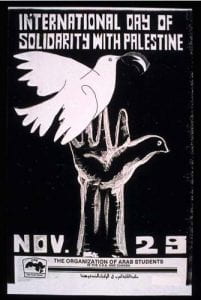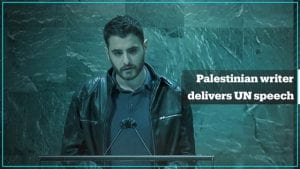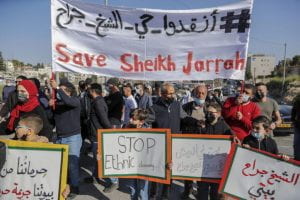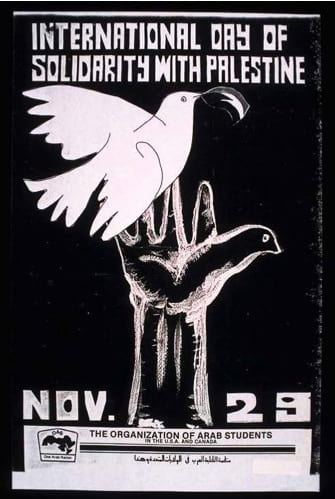In 1977, the General Assembly of the United Nations (UN) declared November 29th as the International Day of Solidarity with the Palestinian People. On this day, the UN holds an annual meeting containing the UN General Assembly and the Committee on the Exercise of the Inalienable Rights of the Palestinian People. This day promotes an opportunity for the international community to recognize the conditions of Palestine. Last year in 2020, the UN committee launched an exhibit focusing on the wall built along the occupied territory of Palestine. This wall is a landmark of significance for thousands of Palestinians as it holds as a symbol of solidarity and resilience. The wall contains poems and different forms of art from many Palestinian artists. This wall has been ruled to be illegal by the international court of justice, yet it holds much significance regarding the fight for Palestinian freedom.

Significance of the Day of Solidarity with the Palestinian People:
The declaration of this day was and continues to be a meaningful step to recognizing the injustices occurring in Palestine. This day serves as a general reminder to the UN and the rest of the world that there are still growing factors that continue to implement misery and suffering among Palestinian people. This year, the UN held the observance at the headquarters in Geneva. During the meeting, the conflicts that occurred this past year were highlighted and spoken about. Such as the expansions of illegal settlements, demolition of Palestinian homes and structures, and the occurring violence caused by the Israeli government and army. In May, Israeli settlers and army forces marched into a Palestinian neighborhood, Sheikh Jarrah, and removed many Palestinians out of their homes. At the General Assembly meeting, Mohammed El-Kurd, a Palestinian activist and journalist from Sheikh Jarrah, gave a speech describing the day the Israeli Jewish Settlers took half of his home. Last year, at the 2020 observance, the Secretary-General of the UN, stated: “we must also do all we can to ease the suffering of the Palestinian people.” The recognition of suffering and the occupation, although small, is a big step in fighting for human rights injustices across the globe. The day of solidarity also calls on the critical humanitarian and development needs of Palestinian refugees, especially during the times of the pandemic and the growing conflict.

An Update on Palestine:
The current conditions of Palestine continue to worsen as time passes by. More individuals are being displaced, more homes are being demolished, and the fight for freedom still continues. Although November 29th provides awareness and brings light to the question of Palestine, it is essential to recognize that every day these events occur. Palestinians are still living under occupied territories with restricted movement. This past year served as a reminder for the Israeli-Palestine conflicts such as the Nakba, also known as the catastrophe. In the spring, many homes in Palestine were demolished and given to Israeli settlers, which was a repeat of events that occurred in 1948 and 1967 in Palestine. Protests occurred all around the world, standing against the settlements and in support of the Palestinian liberation. As the obstacles for Palestinian liberation continue to worsen, the fight for freedom continues around the world.

Human Rights Support for Palestine:
Although the war has been occurring since 1948, there have been acknowledgments worldwide in support of Palestinian human rights. Past U.S. legislation includes H.R. 2407, introduced by representative McCollum in 2019, promoting human rights for Palestinian children living under the occupation. This bill also addresses the most significant factor allowing Israel to continue its injustices: U.S. funding for the Israeli military. The bill calls on the U.S. to cease all funding due to the indirect support that violates international human rights law. Unfortunately, this bill did not make it out of the House of Representatives. However, the bill has been reintroduced, and Rep. McCollum continues to support it along with the introduction of an additional H.R. Bill 2590. This bill directly addresses the U.S. funding and alliance with Israel in efforts to stop the aid of military detentions of Palestinian children. U.S. taxpayer money should not be used to support international human rights violations. With the rise in support by various groups, political organizations, and advocacy groups, it has a higher chance of passing and becoming law. In addition, Palestinian awareness being recognized through congressional bills and days such as the International Day of Solidarity with the Palestinian people, there is great promise in the future of this bill.
What’s Next:
November 29th serves as an important reminder to the international community that the Palestinian struggle still exists, but it is not where our support should end. The topic of Palestinian liberation needs to be spoken about more and recognized. It is imperative to continue educating oneself and others about the Palestinian struggle and its history. A human injustice that occurred in 1948 still exists today and has worsened in aspects. Acknowledgment and bringing it to the attention of members of our government is critical.
For more information, check out these links:
To learn more about the events that occurred in Palestine this past year and the reality of what many Palestinians go through daily watch Mohammed El Kurd’s speech given this year.
To learn more about the history of Palestine and Israel: Check out this interactive link explaining the history.



